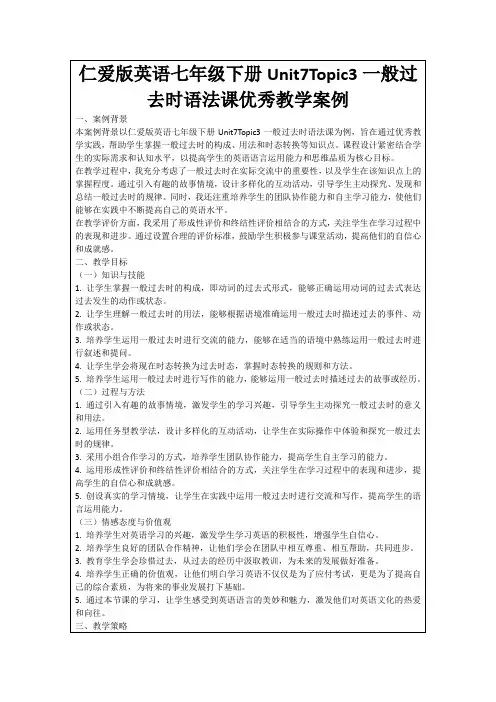仁爱七年级下册一般过去时
- 格式:ppt
- 大小:1.28 MB
- 文档页数:20



一般过去时一般过去时:指已经发生过的动作或事件,至今为止这个动作或事件已经停止。
标志词:yesterday, lastEg: I went to Eric’s party last week.助动词:didEg: Did you go to school yesterday morning?Be动词:was, wereEg: Was the dog here just now?动词的过去式变形1.+ed (一般动词的过去式直接在动词后面加上ed 即可)2.+d (以e结尾动词,过去式直接加上d即可)3.去y + ied (以y结尾, 并且y旁边没有元音字母的动词,把y变成i, 再加上ed)4.动词的不规则变形(以下为常用动词的不规则变形,要牢记这些动词哦!)Irregular verbs 不规则动词infinitive Past tense infinitive Past tense (原形)(过去式)(原形)(过去式)am/is was will wouldare were shall shoulddo/does did can couldgo went may mightcome came must mustrun ran leave leftbecome became lend lentbegin began lose lostbreak broke make madebring brought mean meant build built meet met buy bought pay paid catch caught ride rode choose chose rise rose come came run ran draw drew say said drink drank see saw drive drove sell sold eat ate send sent fall fell sing sang feed fed sit sat find found sleep slept fly flew speak spoke forget forgot spend spent get got stand stood give gave swim swam go went take took grow grew teach taught have/has had tell told hear heard think thought hold held throw threw keep kept wake woke know knew wear wore learn learned/learnt win won leave left write wrote hit hitlet letput putread read句型变换1.一般疑问句:变换句型的规律与一般现在时一致,但是助动词必须使用did,动词的过去式要变回原形。



一般过去时一般过去时:指已经发生过的动作或事件,至今为止这个动作或事件已经停止。
标志词:yesterday, lastEg: I went to Eric’s party last week.助动词:didEg: Did you go to school yesterday morning?Be动词:was, wereEg: Was the dog here just now?动词的过去式变形1.+ed (一般动词的过去式直接在动词后面加上ed 即可)2.+d (以e结尾动词,过去式直接加上d即可)3.去y + ied (以y结尾, 并且y旁边没有元音字母的动词,把y变成i, 再加上ed)4.动词的不规则变形(以下为常用动词的不规则变形,要牢记这些动词哦!)句型变换1.一般疑问句:变换句型的规律与一般现在时一致,但是助动词必须使用did,动词的过去式要变回原形。
e.g. I went to school yesterday. Did you go to school yesterday?He was five years old last year. Was he five years old last year?They had a good time last Sunday. Did they have a good time last Sunday?2.特殊疑问句:同一般现在时规律, 注意助动词和be动词的变化e.g. I played football with my friends yesterday afternoon.When did you play football with your friends?练习一.写出过去式am _____ ride _____ buy _____ watch _____ write_____is _____ visit_____ bring_____ go _____ water_____are _____ swim _____ take _____ run _____ do_____二.用“am , is , was”填空。




仁爱版英语七年级下Unit 7 知识清单Topic 1语法聚焦一般过去式1.一般过去时表示过去某个时间发生的动作或存在的状态,常与 a minute ago,two days / months / years ago, yesterday, last year, in those days, just now,in 1990等表示过去的时间状语连用。
一般过去时也表示过去经常或反复发生的动作。
(1)过去存在的状态。
My father was at work yesterday afternoon.(2)过去某个时间发生的动作。
I got up at 6:30 yeste rday.(3)过去经常或反复发生的动作。
He always went to work by bus last year.2.Be动词在一般过去时中的变化:(1)am和is在一般过去时中变为was。
(was not=wasn’t)(2)are在一般过去时中变为were。
(were not=weren’t)(3)带有was或were的句子,其否定、疑问的变化和is, am, are一样,即否句在was或were后加not,一般疑问句把was或were调到句首。
Eg:Were you born in July,1999?—Yes, I was./No,I wasn’t.3.句中没有be动词的一般过去时的句子(行为动词一般过去时态)否定句:didn’t +动词原形,如:Jim didn’t go home yesterday.一般疑问句:在句首加did,句子中的动词过去式变回原形。
Eg:Did Jim go home yesterday?特殊疑问句:⑴疑问词+did+主语+动词原形?Eg:What did Jim do yesterday?⑵疑问词当主语时:疑问词+动词过去式?Eg:Who went to home yesterday?4.动词过去式变化规则:(1) 规则动词一般在动词末尾直接加-ed,如:pull-pulled, cook-cooked(2) 结尾是e加d,如:taste-tasted, move-moved(3) 末尾只有一个元音字母和一个辅音字母的重读闭音节应双写末尾的辅音字母,再加-ed. 如:stop-stopped, plan-planned(4)以“辅音字母+y”结尾的,变y为i,再加-ed, 如:study-studied(5)不规则动词过去式:am/is-was, are-were, do-did, see-saw, say-said, give-gave, get-got, go-went, come-came, have-had, eat-ate, take-took, run-ran, put-put, make-made,read-read,write-wrote,draw-drew, fly-flew, ride-rode,speak-spoke,sweep-swept,swim-swam,sit-sat,drink-drankSection A1.—When was he born,do you know? 你知道他什么时候出生的吗?--He was born in June,1985. 他出生在1985年6月。

1一般过去时的定义:主要用来描述发生在过去的事情。
1. yesterday (morning,afternoon,evening)2. the day before yesterday3 last night (week,Sunday,weekend,month,winter,year,century4.Ago5 this morning/afternoon/evening6.when引导的状语从句(过去时)7.just now8.the other day -- a few days ago.9 at the age of 10(过去年龄段)10 in the old days11 once upon a time,12 in the past(一)一般过去时态之Be 动词结构:主语+was /were +其它一用be动词的适当形式填空1. I _______ at school just now.2. He ________ at the camp last week.3. We ________ students two years ago.4. They ________ on the farm a moment ago.5. Yang Ling ________ eleven years old last year.6. There ________ an apple on the plate yesterday.7. They _______ glad to see each other last month。
8. The mobile phone _______ on the sofa yesterday evening二、根据时间改写句子1. Today is Monday. (the day before yesterday)___________________2. There are 23 students in our class. (22, yesterday)___________________3 I am in Grade Two this year. (last year)___________________4. My father is 44. (ten years ago)___________________5 We are in No 9 Middle School. (3 years ago, XXX Primary School 小学) ___________________6. He is in Beijing. (last night, Hong Kong)___________________7. Our teacher is better now. (last week, ill)___________________8. My parents are at home today. (yesterday, at work)___________________三、改写句子1. Joy was in Grade One last year.否定句:一般疑问句:肯定回答:否定回答:特殊疑问句:2. Lily was in Qingdao yesterday一般疑问句:肯定回答:否定回答:特殊疑问句:3.I was at home the day before yesterday一般疑问句:肯定回答:否定回答:特殊疑问句:4..The twins were in a primary school last term一般疑问句:肯定回答:否定回答:特殊疑问句:5 There was some orange in the cup(变一般疑问句) _______ there _______ orange in the cup?6 How is Jane yesterday? (改错)____________________7 There _________ (be) no one here a moment ago四单项选择( )1. My father______ill yesterday.A. isn't B. aren't C. wasn't D. weren't( )2.______your parents at home last week﹖A. Is B. Was C. Are D. Were( )3. The twins______in Dalian last year.They______here now.A. are; were B. were; are C. was; are D. were; was ( )4.______your father at work the day_____yesterday (前天)﹖A. Was; before B. Is; beforeC. Was; after D. Is; after( )5.—Who was on duty last Friday﹖A. I am B. I was C. Yes, I was D. No, I wasn't( ) 1. My father______ill yesterday.A. isn’t B. aren’t C. wasn’t D. weren’t( ) 2.______your parents at home last week﹖A. Is B. Was C. Are D. Were( ) 3. The twins__in Dalian last year.They__here now.Aare; were B. were; are C. was; are D. were; was( ) 4.___your father at work the day__yesterday﹖A. Was; before B. Is; beforeC. Was; after D. Is; after( ) 5—Who was on duty last Friday —__A. I am B. I was C. Yes, I was D. No, I wasn'(二)一般过去时态之情态动词结构:主语+情态动词过去式+其它情态动词的一般现在时can / shall / will / may / must情态动词的一般过去时could / should / would / might / must情态动词特点:1 不随主语变化而变化2 后跟动词原形3 否定在后加not 疑问把它提前具体用法:一can /could 能会could 更委婉Eg Can you play basketball?— Y es,I can. /No, I can’t.Could I take you home?— Yes,youcan. /No, I’m afraid not.二Shall表意愿将,要常用第一人称/should 应该Eg Shall I /we go fishing?-----All right. \OK. \Good idea.三will表意愿将,要常用于任何人称/would 表意愿更委婉将,要Eg Would you like to go with me?-----Yes, I'd like to. /I’d love to/Please-------No,thanks/I’m afraid not四May/Might 能可能也许might 更委婉Eg May I drink a cup of tea?-----Yes,you may. No, you mustn’t. (禁止)Might I go now?我可以去吗?—Yes, you may. 可以。
语法讲解:一般过去时态表示一般过去式的动词通常用动词的过去式形式来表示,而动词的过去式是在动词原形的根底上变化的。
动词的过去式可分为规那么动词和不规那么动词。
规那么动词的过去式变化如下:〔1〕一般情况下,动词词尾加-ed ,如:worked played wanted acted〔2〕以不发音的-e 结尾动词,动词词尾加-d,如:lived moved decided declined hoped judged raised wiped〔3〕以辅音字母+ y结尾的动词,把-y变为-i 再加-ed,如:studied tried copied justified cried carried embodied emptied〔4〕以一个辅音字母结尾的重读闭音节动词,双写词尾辅音字母,再加-ed,如:stopped begged fretted dragged dropped planned dotted dripped〔5〕注:不规那么动词的过去式变化规律性不强,须多加记忆。
go - went,make - made,get - got ,buy - bought ,come - came ,fly-flew ,is/am-was,are-were ,see-saw ,bring-brought,do-did,teach-taught, think-thought, are-were, say-said, sit-sat. Read-read, spend-spent.用法:〔1〕表示过去某一时刻或某一段时间内所发生的动作或情况,通常一般过去式带有表示动作时间状语的词,词组或从句,如yesterday, the day before last, last week, two days ago 等,上下文清楚时可以不带时间状语。
I worked in that factory last year. 去年我在那一家工厂工作。